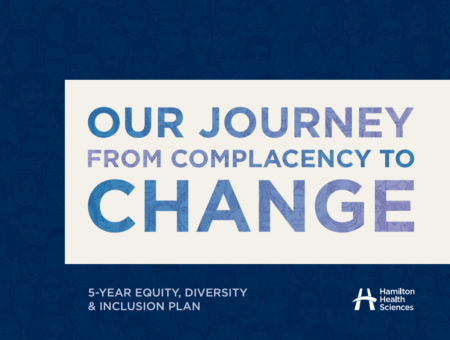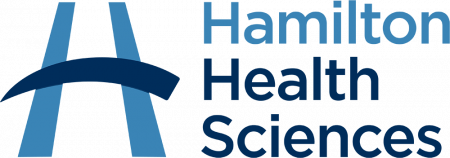ENVIRONMENTAL, SOCIAL, AND GOVERNANCE
At Hamilton Health Sciences we understand the significant role that environmental, social, and governance (ESG) factors play in promoting healthy communities. Because of this, we are deeply committed to implementing sustainable and socially responsible practices throughout our organization.
 From waste generation to greenhouse gas emissions, we recognize that our operations directly impact the health of our environment which, in turn, directly affects the health of our community.
From waste generation to greenhouse gas emissions, we recognize that our operations directly impact the health of our environment which, in turn, directly affects the health of our community.
We stand firm in our commitment to reducing our environmental impact and have prioritized the work required to make HHS a leader in this regard. Much of this work happens “behind the scenes,” especially in managing the energy that powers our hospital, which is a significant part of our carbon footprint. We also continue to address operations that generate visible environmental impacts like waste management, drug disposal, transportation, construction, and linen and food services.
We are proud to say that we continue to consistently meet or exceed all required governmental environmental standards, and in many ways we’re leading in our sector. But we’re committed to doing more, and so we’ve made the development of a comprehensive Environmental Management Plan a key priority within our 2024 Strategic Plan. This plan will focus on three priority areas to set us on a path towards Net-Zero emissions by 2050 and support the health of the environment and, in turn, our community.
To learn more about our environmental management efforts in 2023-24, read the section below, visit our environmental performance webpage, or get an overview in this visual snapshot.
Greenhouse Gas Emissions
At HHS, we’ve committed to reducing our carbon footprint and aiming for Net Zero emissions by 2050. We’re proud to say we’ve already cut our emissions in half, a year ahead of schedule, which has been primarily driven by investing $57 million to upgrade our power systems, making them cleaner and more efficient. By swapping out old generators for newer, greener models and installing better emission control systems, we’ve cut down on harmful gases like CO2 and nitrous oxide. Not only does this help the planet, but it also saves us money by reducing our reliance on the grid.
Environmental Stewardship
We’re developing our first five-year Environmental Stewardship Plan (ESP) to refocus our waste management efforts and establish targets related to managing waste reduction, waste diversion, and reuse. In 2023 work began to develop a robust ESP which involves identifying focus areas, engaging key internal and external stakeholders, conducting greenhouse gas inventories, and developing tools for ongoing monitoring and performance. A vendor has been selected and work has begun, with the goal to release the plan in late 2024.
2023-24 highlights:
1,458 metric tonnes of plastic, paper, cardboard, and metals recycled
Reduced paper waste by 70 metric tonnes
Building greener, cleaner hospitals
We began construction on our brand new West Lincoln Memorial Hospital in Grimsby in 2022, and once built it will be among Ontario’s greenest hospitals. The new hospital will produce about 390 tonnes less CO2 annually, a 50% reduction compared to the current facility. Key features will include:
- High-efficiency heat pumps
- High-performance building envelope with electrochromic windows to help preserve energy
- Water-cooled heat recovery chiller
- Rooftop solar panels providing 5% of the building’s energy
Equity, diversity, and inclusion
 In June 2023, Hamilton Health Sciences (HHS) released its first five-year Equity, Diversity, and Inclusion (EDI) Plan. Based on the input of our workforce and community, the plan outlines the practical steps we’ve committed to taking to make our organization safer and more inclusive for everyone. One year later, our first EDI Progress Report highlights our lessons learned and the progress we made in 2023-24, including:
In June 2023, Hamilton Health Sciences (HHS) released its first five-year Equity, Diversity, and Inclusion (EDI) Plan. Based on the input of our workforce and community, the plan outlines the practical steps we’ve committed to taking to make our organization safer and more inclusive for everyone. One year later, our first EDI Progress Report highlights our lessons learned and the progress we made in 2023-24, including:
- Investing in our EDI team to guide our organization’s day-to-day and long-term EDI work;
- Beginning to collect patient health equity data to better understand and address barriers and factors that impact health outcomes;
- Aligning 223 of our policies with EDI principles, and introducing HHS’ first Anti-Racism policy;
- Completion of EDI training by HHS’ board of directors and executive leadership team to improve their capacity to lead equitably and inclusively;
- Launching Black health initiatives focused on improving health conditions in Black communities;
- Creating an EDI governance structure to ensure EDI remains a priority within all that we do;
- Expanding EDI training and resources for our workforce, including practical guidance for integrating EDI into daily work at HHS; and
- Attaining a five-point increase in the EDI dimensions of our My Voice Matters annual workforce engagement survey, which is four points above the benchmark for health-care providers.
Read the full 2023-24 EDI Progress Report.
While we reflect on the many achievements over the past year, we must also acknowledge that our journey is far from complete. Guided by our EDI Plan, we’ll continue to hold ourselves and our organization accountable, challenging each other to do better and be better every single day for the patients and communities who rely on us for health care.
Staff & physician safety and wellbeing
Our staff, physicians, learners, and volunteers are paramount to our hospital’s success. Guided by our 2018-2023 People Plan, we implemented innovative programs prioritizing workforce experience, safety, and wellbeing. Looking ahead, we continue to prioritize the safety and wellbeing of our people as a strategic imperative.
In 2023-24, HHS received a number of employer awards, reinforcing our commitment to being an exceptional workplace.
- Canada’s Top Employers for Young People
- Hamilton-Niagara’s Top Employers
In 2023-24 we launched a number of initiatives aimed at creating a healthy and safe workplace, including:
- The introduction of HHS’ first Anti-Racism Policy, and updates to our Workplace Violence and Workplace Harassment & Discrimination protocols
- Leader training sessions to ensure understanding and implementation of the above policies & protocols, with a 97% completion rate including physician leaders.
- The introduction of the unique K9 Assist program, which uses animal therapy to reduce stress and burnout among staff and physicians.
- The expansion of our Shine staff & physician wellness centres to our Urgent Care Centre site, offering dedicated space for fitness and wellness activities.
Read more about our work to create a healthier, safer workplace in 2023-24.
Population health & health equity
Hamilton Health Sciences prioritizes patient-centred care, striving to make it safer, more equitable, and accessible for all. In 2023-24, we maintained our focus on enhancing patient outcomes and the health of our community through initiatives focused on improving access to care, and supporting patients directly in the community.
Read more about our efforts to advance population and health equity.
Our organization’s governance is based on its purpose, performance, principles, and structure. At the top of our Board of Directors, guiding decisions and strategy for health care quality and fiscal responsibility. Executive leaders, frontline leaders, and other key stakeholders also play key roles.
Ontario hospitals must follow the Public Hospitals Act, which sets the minimum legal standards for governance, including having a Board, administrator/CEO, committees, along with reporting requirements and other regulations.
Key governance factors at HHS include Board structure, financial transparency, procurement, ethics, Accreditation, quality improvement, and data security.
Board structure
Hamilton Health Sciences’ Board of Directors has 18 members (including voting and non-voting). The Board meets regularly between September and June of each year. Members of the public are invited to attend the open portion of board meetings.
Board Committees:
- Audit & Resource Committee
- Executive Committee
- Governance Committee
- Compensation
- HR Committee
- Quality Committee
- Research and Innovation Committee
Financial transparency
At HHS, we prioritize financial integrity through internal audits, enhancing efficiency and controls. These independent reviews identify improvements, optimizing our financial performance. Annually, external auditors conduct a comprehensive audit, ensuring reliability and accountability to stakeholders. Our commitment to fiscal responsibility is evident through transparent practices, surpassing Broader Public Sector (BPS) standards. We adhere to the BPS Accountability Act, providing clear financial information to the public. This includes audit reports, financial statements, and compliance attestations. Our practices ensure efficient resource allocation, delivering quality health care while maintaining stakeholder trust.
HHS publicly discloses the following information for its stakeholders:
- Annual Audit Reports
- Annual Audited Financial Statements
- Travel & Expense Policy
- Executive Expenses as defined by the Ministry of Health
- Attestations to Procurement compliance and use of consultants
- Hospital Accountability Reports
- Business documents that contain information on performance and results
- Public Sector Salary disclosure
HHS also submits financial data to the Province of Ontario and to the Canadian Institute for Health Information (CIHI) that is captured in the Canadian MIS Database (CMDB). This information informs publicly available dashboards on hospital spending, cost of a standard hospital stay, and the corporate service expense ratio.
Hospital funding uncertainties require us to constantly strive to find creative and innovative ways to improve fiscal performance without compromising care quality. For example, we devote resources to projects, initiatives, and partnerships aimed at improving population health and reducing the number of preventable hospital visits.
Procurement
Supply chain management is crucial in health care due to the complex and fragmented nature of procuring essential items. The pandemic, inflation, and global geo-political unrest have exposed significant challenges with supply disruptions and shortages, complicating efforts to deliver high-quality, affordable care. To tackle these issues, health care providers must enhance supply chain efficiency. Streamlining processes, optimizing inventory, and fostering supplier collaboration can yield substantial cost reductions and supply continuity. Leveraging data analytics provides better visibility, highlights inefficiencies, and supports cost-reduction strategies. Additionally, collaboration and knowledge-sharing within the industry are vital. Participation in group purchasing organizations, sharing best practices, collaboration with peer hospital organizations, and benchmarking has helped us overcome supply challenges, mitigate shortages, and ensure the availability of necessary items for effective patient care.
In 2023-24, we also advanced our procurement practices through:
- Benchmarking of vendor base to determine alignment with HHS Values-Based initiatives
- Expansion of Sustainable Procurement Coalition from provincial to Canada-wide
- Continued engagement of Procurement Leaders ESG-EDI Working Group (provincial, hospital procurement leaders)
- Vendor meetings to discuss sustainability initiatives related to clinical categories
- Products available via our SSO/GPO, Mohawk Medbuy Corporation (MMC), have been identified and are currently undergoing financial and clinical evaluations on feasibility. Results will be reported to Leadership for decision
- Policy revisions to support HHS’ Values-Based Procurement model and recent legislature such as Bill S-211 (Fighting Against Forced Labour and Child Labour in Supply Chains Act) and recent changes to the Broader Public Sector (BPS) Directives
Ethics
Using an ethical framework, the following offices, along with key stakeholders, participate in the Integrated Ethics Committee that addresses organizational ethics issues, reviews policies and supports ethical practice:
- The Office of Ethics addresses ethical issues from bedside to boardroom, and builds ethics capacity through education and resources, across HHS and the region (regionalethicsnetwork.com).
- The Office of Patient Experience addresses patient complaints and concerns and promotes the integration of patient/family voice in care planning and delivery.
- The Privacy and Freedom of Information Office is committed to patient privacy and the respectful care of the personal health information (PHI) in our custody and control.
- The Research Ethics Board Office ensures compliance with research ethics best practices, and addresses concerns and questions related to research ethics and issues.
Highlights
- The Ethics Consultation Service supports conflict resolution and reflective practice re: patient care planning through coaching and mediation.
- Whistleblowing Protocol supports reporting through HHS’ independent, external service provider, ClearView Connects. This anonymous process ensures the protection of whistle-blowers.
- Values-based Code of Conduct (VBCC) focuses on promoting respectful workplaces. The VBCC will be refreshed in 2025 using an EDI lens to acknowledge that there are cultural differences that will impact what individuals perceive as appropriate and inappropriate conduct. The refresh includes training on our VBCC and EDI-related topics such as micro-aggressions.
Accreditation
In 2023 HHS was accredited with Exemplary Standing by Accreditation Canada for the fourth consecutive time.
“Exemplary Standing” is the highest level of accreditation possible. It means we have succeeded in meeting Accreditation Canada’s very rigorous standards of excellence.
Being accredited signals to all that HHS is committed to highest possible standard of quality and performance. During the accreditation process, HHS was assessed against 3,714 criteria across 25 sets of standards, which includes 452 tests of compliance for Required Organizational Practices. Hamilton Health Sciences met or exceeded more than 98 per cent of these standards.
Accreditation Canada surveyors acknowledged several strengths and accomplishments in their final report, including:
- HHS’ resiliency and response through the COVID-19 pandemic
- Our continuous efforts to fulfill and balance our roles as a community and regional hospital, an academic teaching institution, and a leading research facility.
- The pride demonstrated by staff and physicians for the work they do and their support of each other.
- HHS’ unique Continuous Quality Improvement Management System and our integrated approach to identify, measure, monitor and manage improvement priorities.
- The significant capital infrastructure investments being made across the sites to improve our facilities and equipment.
- Our commitment towards the wellness and professional growth of staff
- Our organization’s investment in leadership and staff development and wellness.
This is a testament to the collective, continuous efforts of our teams to relentlessly pursue quality in all that we do. We continue to work through and implement the recommendations arising from our 2023 Accreditation assessment, which will drive further improvements.
Quality improvement
HHS has a long and successful history in Quality, Patient Safety and Risk, beginning in the early 2000s.
- HHS has been ahead of the curve in developing key models and frameworks to advance the Quality agenda
- During this history, HHS developed and/or uses several models/ frameworks in Patient Safety, Utilization, Patient Experience & Engagement and Quality
HHS has robust policy, governance and systems infrastructure that support the identification, assessment and action planning in response to quality and patient safety opportunities across the organization.
This includes responsive protocols for identification and investigation into root causes of critical incidents and regular reviews at the organizational leadership and board of directors on the overall trends related to quality performance, patient safety occurrences, patient experience results and critical incident reviews.
Patient story telling continues to be an important feature of HHS’s quality, patient safety and patient experience discussions for several years at multiple levels of the organization. With these stories shared, important context is built around the successes and challenges across HHS in quality, safety and related issues.
- A daily culture around improvement has been advanced through the Continuous Quality Improvement Management System, CQI-MS, or simply CQI. CQI is our strategy to change culture into one where everyone is a problem-solver – achieving results by aligning key systems and tools with key behaviours.
- CQI is about building a culture of continuous quality improvement
- Quality touches on everything HHS does as a health-care system, from the administrative processes in the boardroom to the daily clinical tasks completed at the bedside
Our CQI approach began in September 2016 and has been implemented almost everywhere across the organization, resulting in several thousand improvement opportunities of various sizes and scales being implemented since the system was started.
- Working to grow the system to be more than just tools but also hard-wiring the necessary behaviours that build a culture of improvement
- CQI processes have helped teams with engaging our patients to partner in promoting safe patient care and responsiveness to patient care needs
Privacy & cybersecurity
With an increase in the threat level of cybersecurity attacks on public sector institutions in recent years, HHS has worked alongside regional partners to ensure we have sophisticated systems and practices in place to protect hospital and patient data. In 2023-24, we:
- Worked with partners at St. Joseph’s Healthcare Hamilton and Niagara Health Services to strengthen 18 partner hospitals’ ability to identify, protect, detect, and respond to cyber-attacks, securing patient care regionally. This includes an assessment of the respective hospitals’ cybersecurity practices against an accepted security framework to help identify any gaps among regional hospitals.
- Onboarded a leading Managed Security Service Provider (MSSP) to monitor and protect our endpoints 24/7, responding to active threats as they happen to ensure maximum protection of patient and hospital data.
2023/24 highlights
-
- International Data Privacy Week educational content for staff education and learning
- Compliance Dashboard created and published to offer real-time staff privacy training compliance rates
- Success launch of the Privacy Awareness Campaign to drive staff and credentialed staff privacy training compliance
- Updated the public Patient Privacy Statement and delivered new Statement of Information Posters to all HHS sites
- Approximately 74 corporate, clinical and research projects supported by Privacy (e.g. ServiceNow, Stryker Robot, QIAGEN, AMPLIFI, Voyce)
- Achieved the highest compliance rates in HHS history, employees and physicians – 2023 holding pattern into 2024
- International Data Privacy Week educational content for staff education and learning
- Annual Privacy e-module LMS training updated
- De-Identification policy finalized and to be published
- On-demand virtual and in-person privacy training with departments
- New Physician Leadership Orientation in-person training
- Continuous privacy support on key corporate, research and clinical initiatives (CIAMI, M365, CARE data collection, and AI driven projects like DAX-CO-Pilot/Nebula/Cosmos)
